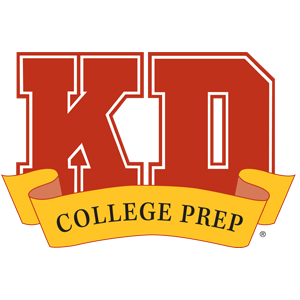If you’re like many high school students, you enjoy the flexibility of being able to choose at least some of your high school classes. Yet, the freedom to choose can also be a bit stressful at times. How do you know if you’re choosing the “right” classes that will translate well to your college education and career ambitions?
Preparing for college is a marathon, not a sprint, and it should start by 9th grade. (Some students begin even earlier, in middle school.) Selecting high school classes with an eye toward college goals is one of the ways you can lay a foundation for success beyond 12th grade.
10 Tips for Choosing High School Courses
1. Talk to your high school guidance counselor
Selecting high school classes requires a careful balancing act. You’ll need to not only fulfill the typical expectations of a college admissions officer but also meet your high school’s and state’s graduation requirements. In addition, you should simultaneously choose classes that align with your academic, career, and personal interests. For example, colleges have their own high school course requirements and expectations that students need to research prior to choosing their courses.
It can be tough to check off all of those boxes by yourself, but fortunately, you don’t have to. Your high school guidance counselor is an essential resource. Scheduling an appointment to chat about your class schedule should be a top priority in the first few days of 9th grade. (At the beginning of each semester, you should always make a note of the deadline to add or change classes.)
Sometimes, families need expert guidance beyond what is provided by their high school. If this describes your situation, you may consider signing up for college counseling services. KD College Prep provides a wide range of options for students to speak with an admissions expert and get specific advice on how to select the right high school classes for their desired path.
2. Be sure to meet your core class requirements
College-bound students are usually expected to take five core academic classes each year, and high schools generally require this, as well. This is an easy chunk of your schedule to plan since there is little wiggle room. Each year, you’ll take core classes in:
- English
- Mathematics
- Science
- History
- Foreign language
Depending on the breadth of your school’s course offerings and your grades, you may have a little flexibility within those categories. For instance, if you get good grades in math during 8th and 9th grade, you may take an advanced math class later on.
Your guidance counselor will help you ensure that you’re on track to meet your state’s and school’s graduation requirements with your core classes.
Like we mentioned above, it’s also important to do your own research. We recommend reviewing the high school prerequisites for your desired degree program early on in your high school journey so that you can set your goals accordingly. This information is usually available on the college website. For example, here is a link to UT-Austin’s high school course requirements.
3. Play to your strengths
Aside from the required core classes, you’ll have some flexibility to choose additional courses. It never hurts to play to your strengths, provided they align with your personal interests and career goals. For example, it’s unlikely that you’ll become an astrophysicist if you struggle with math—but don’t worry. There are lots of options when choosing your desired program or career path. If math is a real challenge for you, then you might not want to pursue intensive math classes like calculus. Instead, you may prefer to take more courses in the humanities, such as AP Psychology or fine art classes.
You’ll want to be mindful of your strengths and weaknesses but also understand that high school is a journey. It’s not uncommon for students to overcome learning challenges as they progress through their courses. Who knows? Maybe, with good instruction or new study techniques, your weakness in 9th grade could become your strength in 11th grade. Be realistic with yourself while still striving to always do your best.
4. Don’t be afraid to challenge yourself
While it’s never a bad idea to play to your strengths, this doesn’t mean you should always select the easy route, especially when preparing for college. Admissions officers prefer to accept students who have shown that they aren’t afraid to challenge themselves by taking rigorous courses. This isn’t to say that you should take AP Calculus if you struggle with math. Rather, you should take the most rigorous courses available to you in your area of preference.
Of course, not every student is enrolled at a large, well-funded high school with an extensive course list that rivals those of higher education institutions. College admissions departments understand that not every high school offers rigorous courses in every subject area. You’ll get some leeway if your school doesn’t offer a lot of rigorous classes. However, admissions officers at selective colleges will expect you to take the most rigorous academic path available to you within your area of preference.
Many students understandably worry about their grades dropping if they take harder classes. Wouldn’t it be better to get excellent grades with an easier schedule? Actually, a college can tell if you took the easy path. For example, a college may prefer to admit B students who challenged themselves rather than straight A students who took only participation-based classes, like a heavy amount of PE classes in place of more-challenging electives.
5. Start taking foreign languages as early as possible
High schools vary considerably in their foreign language offerings and requirements. As a general rule of thumb, high schools and colleges expect or require that students will have taken at least two to three years of a foreign language by graduation. However, taking a foreign language throughout your entire high school career is definitely preferable.
In some schools, middle schoolers may be allowed to take foreign language if they get good grades in humanities subjects. If that describes you, then jump at the chance to get a head start.
Which foreign language should you take with an eye toward preparing for college? Colleges really won’t care which one you take, but they will care that you took the same one each year. Consistency matters.
When selecting a foreign language, consider your personal interests as well as career goals. Perhaps you’d love to pursue a career in medicine or nursing. It may be a good idea to choose a language like Spanish since that language is prevalent in many communities across the U.S. (If you become a doctor, for example, speaking Spanish can be a major asset when working with patients or volunteering in Spanish-speaking countries.)
On the other hand, if you dream of backpacking in Europe for a year after college, you might want to take French, Italian, or German.
If you’re still having trouble choosing the right language for you, check out foreign language tutorials, apps, and other resources online. There are plenty of free and low-cost options available. Take a few lessons in a couple of different languages to see which appeals to you.
Again, do your research! Some colleges will award credits to students who meet certain foreign language requirements or can prove language proficiency through proctored testing. Wouldn’t it be nice to enter college with foreign language credits already completed?
6. Look ahead to evaluate the possibilities in college
Another important consideration when preparing for college with your selection of high school classes is to check out your options in college. What would you like to major in as a college student? What sort of career field are you interested in? If perusing a college course catalog sparks a keen interest in sociology, then you may want to select more humanities classes in high school.
Looking ahead to the possibilities in college is also important if you have your heart set on attending a specific university, type of school, or specific academic program within a school. Each school has its own admissions requirements and preferences.
If you already know that you’d like to attend a less competitive public university, then the requirements you’ll need to meet won’t be as rigorous as those of an Ivy League like Cornell or a highly selective public university like UC-Berkeley. Similarly, certain degree programs within non-state schools have more rigorous requirements, such as the Texas A&M University College of Engineering, which averages a low acceptance rate of 10% to 15%.
7. Branch out and consider new interests
With all of the graduation requirements and college-related considerations involved with selecting high school classes, some students may forget another important factor: their personal enjoyment. High school is supposed to be a time when you can try new things, experiment with different interests, and—yes—have fun!
Don’t be afraid to branch out and try something new just for the heck of it. For instance, even if you’re a science- or mathematics-inclined student who isn’t that great at art, you might consider taking a pottery class just to see if you enjoy it. Although it might not seem like it right now, life really is short, and knowing what you enjoy most is important. (At the end of the day, this whole college prep process is about finding the path that will you the most happiness in the long run.)
8. Take at least one music, art, or performing arts class
Speaking of pottery classes, you’ll need to plan on taking at least one music, art, or performing arts class. This might be a requirement for graduation from your high school. Even if it’s not, colleges typically require or expect that students will have taken at least one or two semesters of art-related classes.
9. Check in with your guidance counselor every semester
It’s important to be proactive in checking in with your guidance counselor at least once during each semester. At the very least, you’ll need to ensure that your course schedule is keeping you on track toward meeting graduation requirements. In addition, you’ll likely want to chat with your counselor about your academic interests, intended college and major, and career goals—all of which can change over time.
10. Try not to overload yourself
Previously, we discussed how selective colleges prefer students who took the most rigorous path available to them. It’s important to challenge yourself; however, high school is a balancing act. You’ll need to ensure that you’re not getting overloaded and overwhelmed by a rigorous schedule.
A B average can be overlooked, given appropriate course rigor, but if your grades drop below this, you’ll put yourself at risk of getting more college rejections than acceptances. Know your abilities and your limits and choose high school classes accordingly by finding a good balance in your schedule.
For instance, if you’re planning on taking AP Physics in a particular semester and you already know it’s going to challenge you, then you shouldn’t cram in a few more AP classes just because you think you should. Make sure you’re up to the challenge and can give your schedule the attention it requires.
You might also balance your course schedule with your time-intensive extracurricular activities. If you play baseball in the spring, then try to take harder classes during the fall semester.
On a final note, it’s important to consider how test scores play into the mix of building an attractive college application. High school grading practices vary from school to school, so grades don’t always provide colleges with a good overview of a student’s level of preparedness. Good test scores can strengthen a college application by giving colleges another data point to consider. Plus, if your grades aren’t quite what is typically admitted at a particular college, a good test score can help your application find its way to the accepted pile.
Do colleges prefer AP or honors?
Colleges like to see students who challenge themselves, whether it be through Advanced Placement (AP), honors classes, or International Baccalaureate (IB) classes. No matter which you select, you’re taking a solid step toward preparing for college. This is good news for students enrolled in high schools with a limited course offering.
Do note, however, that if you have a choice between an AP vs. honors class in the same subject, taking the AP class may allow you to earn college credits. In addition, AP courses are considered collegiate-level, which means doing well in these classes can demonstrate your college readiness.
What classes should I take in high school to get into an Ivy League?
All Ivy League schools expect their applicants to demonstrate a very high GPA and high scores on admissions tests. They also look for rigor in high school class selection (i.e., AP or honors classes), as well as consistency and growth over time. For instance, if you have the option and inclination to do so, taking drama classes over multiple years, and maybe even performing in school productions, will demonstrate that you’re able to commit to your interests.
What is the most useful class in high school?
There is no universal answer to this question. The most useful high school classes are the ones that will prepare you for life after high school—wherever your path may lead you. If you’re intent on working for NASA as an engineer or astrophysicist, then the most useful classes will be advanced science and mathematics. For other students, the most useful classes might be trade classes.
Sometimes, the most useful class isn’t actually the most impactful class. After high school, you might have fond memories of a teacher who made you fall in love with art history or literature, even if those subject areas aren’t terribly relevant to your career choices.
Do colleges care about high school electives?
Colleges care most about your performance in core subject areas and how well you demonstrate that you aren’t afraid to challenge yourself. However, colleges also look for well-rounded students. Your electives demonstrate both academic interests and personal interests (i.e., performing arts or music).
Ultimately, there is no “wrong” choice when it comes to selecting high school electives. In fact, you can bring them up during your college interviews—even the ones that don’t align with your career interests. For instance, if you took an elective in early childhood education, you might mention that it inspired your plans to serve as a Head Start volunteer while in college—even if your intended career isn’t related to education. Colleges like to see students who enjoy being active both on campus and in the greater community.
Why are high school electives important?
High school electives are critically important for several reasons, but many students would likely say that the most significant reason is the freedom of choice. Having the ability to choose some of the classes you’d like to take provides a measure of freedom and self-determination. It also allows you to pursue your own interests—and both of these perks can help you feel more engaged in the school environment, furthering your self-motivation and encouraging you to be a proactive participant in your own education.
How do I choose the right electives in high school?
The best electives for one student might not necessarily be the best ones for you. Taking electives based on your shortlist of colleges, degree programs, and career aspirations is always a safe bet.
Choosing high school classes, including electives, can be a challenge. Not only should you consult your high school guidance counselor, but it can also be tremendously helpful to talk to a college counselor. Even more so than guidance counselors, college counselors have a deep understanding of what specific universities and their academic programs look for in applicants.
Need help high school course selection?
KD College Prep is a leading provider of online and in-person services for students preparing for college. In addition to our test prep programs, we offer an array of college counseling services, including aptitude assessments and assistance with selecting high school classes.
Schedule a free consultation to learn how to get started.































